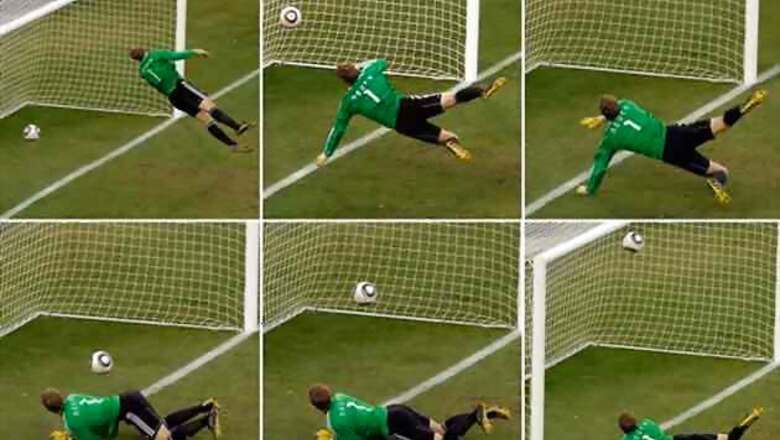
views
Geneva: FIFA surprisingly opted for GoalControl on Tuesday as their goal-line technology system to be used at next year's World Cup in Brazil, picking the little-known German project ahead of more established rivals like Hawk-Eye.
GoalControl-4D uses 14 high-speed cameras placed strategically around a stadium to track a ball's position, in a similar manner to the the Hawk-Eye system which was predicted to win after establishing its reputation for accuracy and added entertainment value in top-level tennis and cricket.
While Hawk-Eye was at the forefront for several years during efforts to break down FIFA President Sepp Blatter's initially stubborn resistance to high-tech help for referees, the GoalControl company was formed last year and was licensed by football's world governing body only one month ago. Two other systems were also in the running - GoalRef and Cairos, which both use magnetic sensor fields in the goal frame to track an "intelligent" ball. All four systems met FIFA's demand that a signal is transmitted to the referee's watch within one second if a goal should be awarded.
GoalControl managing director Dirk Broichhausen said in a statement Tuesday that Brazil is a special place for world football "where emotions from ghost-goals are not welcome."
"We believe that this will be an important milestone for the breakthrough of goal-line technology in international markets," he said. After being licensed by FIFA on March 1, Broichhausen told The Associated Press that the system's simplicity was its strength.
"Our innovation, and also a difference looking to other competitors, is that we can use standard goals, balls and nets. There is no modification necessary," said Broichhausen, whose company is based in Wurselen but already established an office base in Brazil.
GoalControl was the last entry in a race that opened up when Blatter reversed his stance after seeing FIFA's match officials embarrassed when England midfielder Frank Lampard had a clear goal disallowed against Germany at the 2010 World Cup. GoalControl was not even formed in 2011, when the purchase of Hawk-Eye by long-time World Cup sponsor Sony Corp. ahead of undergoing FIFA-endorsed tests suggested the English project was the favorite.
GoalControl's cameras - seven trained on each goalmouth - passed FIFA-approved tests in February in German stadiums in Duesseldorf and Gelsenkirchen. Broichhausen estimated that GoalControl will cost €200,000 ($260,000) per stadium to install, and €3,000 ($3,900) per match to operate.
"We want to offer tournament organizers and leagues and clubs not to have to change anything on the pitch. The investment in the technology is enough," he said last month.
The system will be used at six Confederations Cup stadiums this summer and at 12 for the World Cup, and FIFA said the cost of installation was taken into consideration.
"The respective bids were also judged on cost and project management factors such as staffing and time schedules for installation," football's governing body said in a statement.
FIFA's contract with GoalControl for the World Cup can be reviewed if there are problems at the 16-match Confederations Cup, or even before. "The use of GoalControl-4D in Brazil is subject to a final installation test at each stadium where the system will be installed," FIFA said.
FIFA, through its rule-making panel known as IFAB, approved goal-line technology last July, when Hawk-Eye and the German-Danish project GoalRef passed the rigorous testing process.
Those systems were tested at the Club World Cup in Japan last December, before Cairos and GoalControl had even been licensed.
After Blatter's mind was changed in Bloemfontein three years ago, FIFA performed another U-turn last month when it withdrew previous opposition to publicizing goal-line rulings.
Now, competition organizers can choose whether decisions are shown to fans on big screens in stadiums and television viewers. In tennis and cricket, anticipation of a decision provided by Hawk-Eye has become part of the in-game entertainment.
"It's not secret," Blatter said on the sidelines of the IFAB meeting in Edinburgh. "Once we have the technology and it shows it's a goal or not a goal, we have to be transparent, otherwise there's no need to do it."
Referees still have the final say on awarding a goal, or even using goal-line technology when it is installed. Mandatory pre-game tests give match officials the option to switch off the technology if they doubt its accuracy on that day.
Hawk-Eye, GoalRef and Cairos will now seek to persuade other football clients, such as the English Premier League or German's Bundesliga, to choose their systems before next season begins in August.
















Comments
0 comment